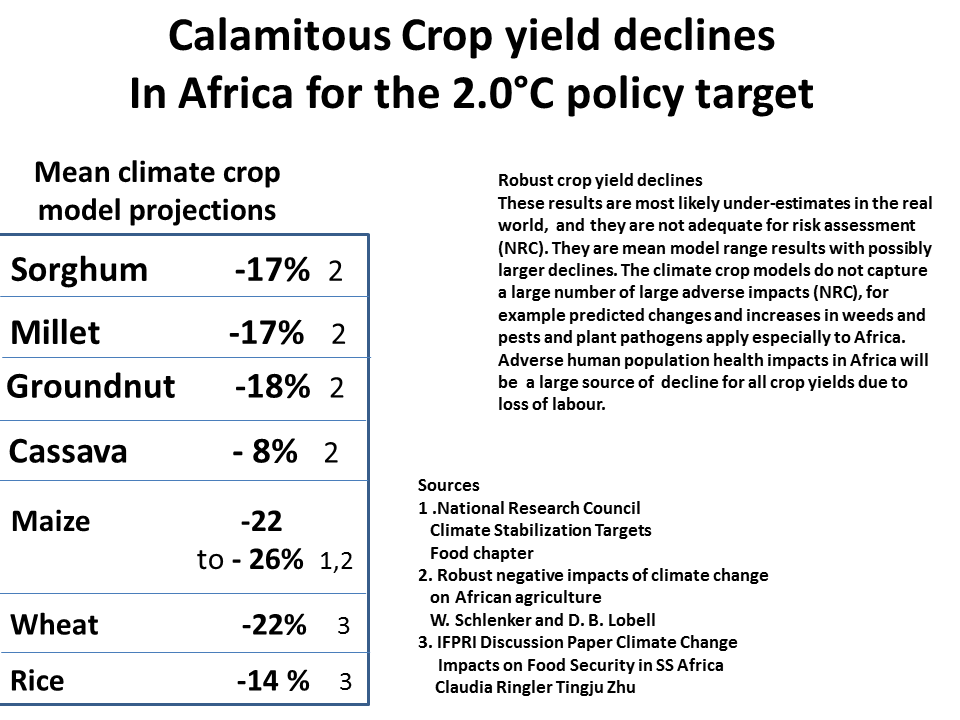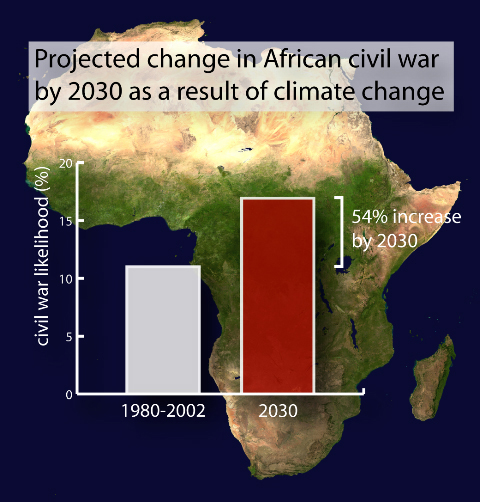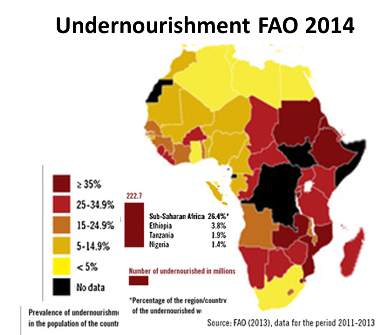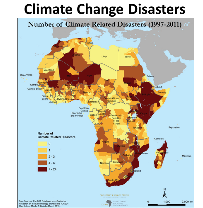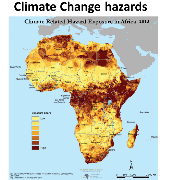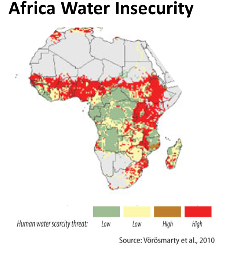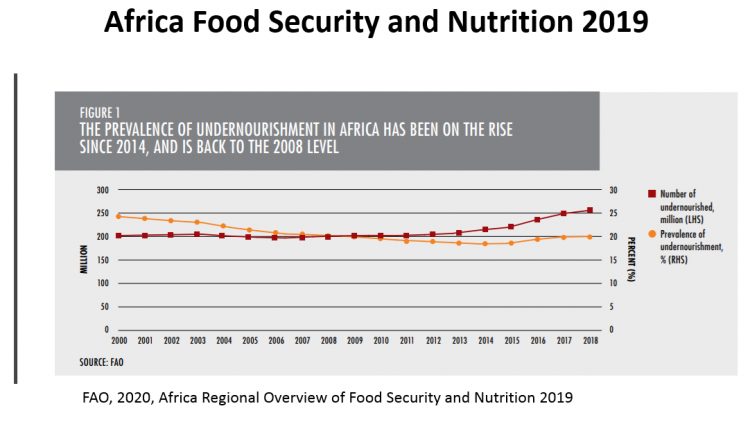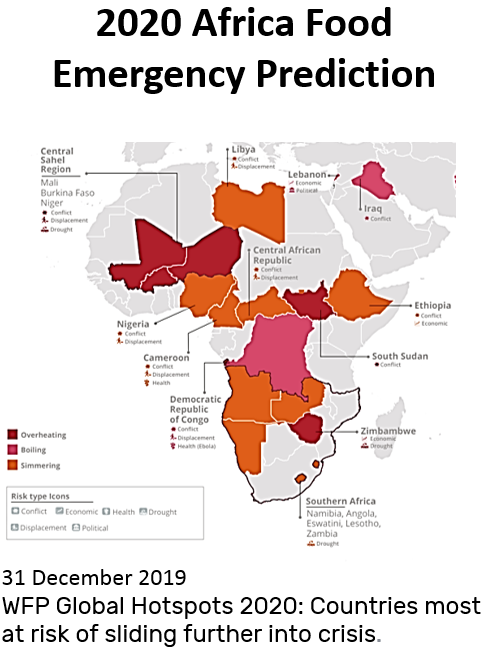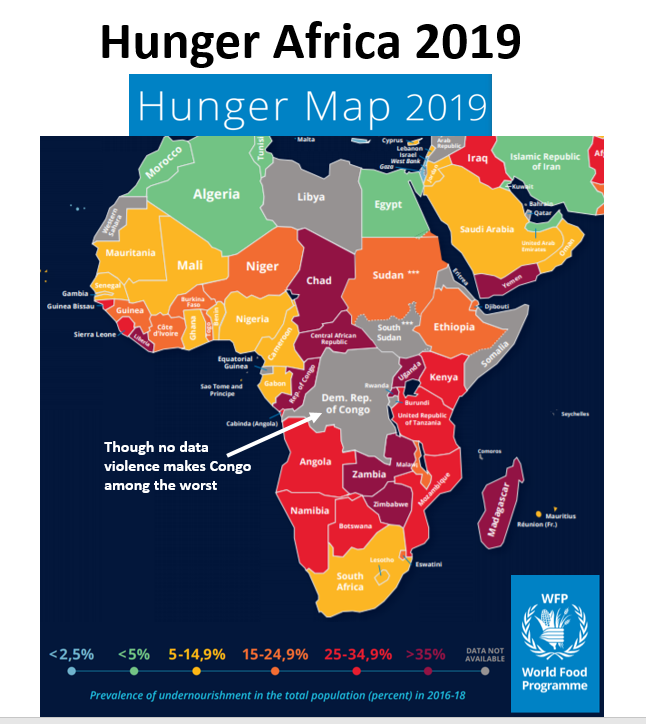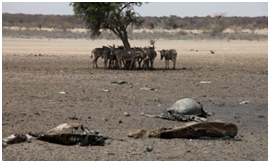Crop models published in Robust negative impacts of climate change on African agriculture by W. Schlenker and D. Lobell indicate that by 2050 mean declines for maize, sorghum, millet, groundnut, & cassava are
−22, −17, −17, −18, & −8% respectively
Climate Change Worsening the Food Situation in
Sub Saharan Africa, 18th June 2012
Climate Emergency Africa
The impact of climate
change on S. Africa
J. Griffin
Africa's lands and populations are
the most climate change vulnerable in the world
It is well known that the most climate change most vulnerable region is Africa.
However research into Africa climate change impacts has been neglected, and
Africa is not given special consideration in climate or energy international policy
discussions and plans.
What research there is we have combined in a chart of the climate by crop
with yield reduction projections. The average for all crops is -17%,
which is clearly catastrophic.
The single best research paper is Robust negative impacts of climate change on African agriculture W. Schlenker and D. Lobell
Prologue
The present styles of living are way beyond the Earth’s carrying capacity. Ecosystem degradation is rampant in almost all regions of the world. The FAO concurs that habitats and ecosystems in Africa currently face threats from several factors such as deforestation, land degradation, and massive reliance on the earth’s biomass for energy needs such as fuel, charcoal and firewood.
The UN Rio+20 statement acknowledged that there have been serious setbacks in the development already gained in the achievement of the Millennium Development Goals, owing to multiple and interrelated factors such as food insecurity, climate change and biodiversity loss. The draft further acknowledges that the future predictions of these disasters are likely to aggravate the already worsening situation, and that urgent responses must be taken (11). It is widely acknowledged that human population growth and economic activities are the leading causes of the negative changes observed in the earth’s biomes (WHO, 2005).
Agriculture contributes significantly to climate change in both positive and negative ways. However, agriculture offers a unique opportunity to draw up the carbon levels that are presently in the atmosphere. Could this be a key in combating climate change at all levels of growth and development?
MOVING TOWARD AFRICA ADAPTATION POLICY
Climate change adaptation policy in Africa is insufficient to tackle adverse affects of climate change impacts. Sluggish political systems; weak institutional capacity and framework; poor coordination and implementation of existing environmental legislations; absence of foresight in national development planning and climate resilience; international abandonment and unfavorable global settings to enhance Africa‘s capacity to develop climate change adaptation and mitigation continue to undermine continent‘s adaptation strategies. Existing policy is scattered, conflicting and incoherent rendering it insufficient to give the continent a survival chance under adverse climate change impacts. Consequently in a business as usual Africa; adverse effects of climate related disasters will far outweigh the capacity of any given country to recover. Puny implementation of climate change adaption and other environmental policies: Very few countries have specific climate change policy or legislations. NAPA implementation by LDC‘s is also slow owing to lack of sufficient political commitment. Institutional failure: absence of a regional institution for monitoring climate change adaptation policy developments or enforcement of environmental regulations, data collection, and dissemination for policy development and scientific communication. Information scarcity: Climate data exists in some countries; however, this information is not availed internationally, or incorporated into national/regional development planning or in disaster reduction strategies. Limited human resource to produce, analyze and interpret and disseminate climate data as a result of poor investment into scientific research on climate change impacts, adaptation, and mitigation; biodiversity and ecosystems; and weak governance and surveillance of natural resources especially forests weaken the region‘s capacity to adapt to climate change.
Access the entire report at:
Moving towards climate adaptation policy in Africa A CEI study Report 2015
Africa food security and climate change
Moving towards climate adaptation policy in Africa A CEI study Report 2015
IPCC AR5 WG2 Africa Executive Summary
- African ecosystems are already being affected by climate change, and future impacts are expected to be substantial
- Climate change will amplify existing stress on water availability in Africa (high confidence)
- Climate change will interact with non-climate drivers and stressors to exacerbate vulnerability of agricultural systems
- Climate change is a multiplier of existing health vulnerabilities (high confidence), including insufficient access to safe water and improved sanitation, food insecurity, and limited access to health care
- Of nine climate-related key regional risks identified for Africa, eight pose up to high risk even with highly adapted systems by 2.0C (Above are all high confidence)
WE Must Get it Right
Common but differentiated responsibilities and abilities
An agreement that sanctions disappearance of Island nations; puts the most vulnerable at greater risk is unacceptable. Moral and social justice loudly speak against sanctioning these vulnerable states and populations to oblivion.
Introduction
Stakes are high. Moving from acknowledging climate change as a threat to human security issue toward tangible sustainable solutions for the well-being of the planet, human life and ecosystems is taking place. New York SGD’s Summit and Paris Climate talks both take place in 2015. History is being made in a generation affecting trans generations to come.
‘‘Of nine climate-related key regional risks identified for Africa, eight pose medium or higher risk even with highly adapted systems, while only one key risk assessed can be potentially reduced with high adaptation to below a medium risk level, for the end of the 21st century under 2°C global mean temperature increase above pre-industrial levels (medium confidence).’’ (IPCC AR5).
IPCC Africa risk projections under climate change:
- Land temperature in Africa will rise higher than global land average
- Reduction in precipitation especially in North Africa and Southern Africa while Sub Sahara predictions remain uncertain.
- Ecosystems range shift due to CO2 and warming while future shifts will be significantly high
- Amplified water stress
- Disruption of agriculture systems especially in semi-arid lands
- Increased food insecurity
- Increased risks to water vector and waterborne diseases
- Adverse effects on livestock
- Triggering migration
- Climate change will also exacerbate/multiply existing threats to human security such as food insecurity, food, health, etc.
The residual impact in a 2°C at the close of the 21st century suggests that even under high levels of adaptation there would be very high risks for the region.
- Adaptation gap in Africa is huge. As indicated by various studies; the present institutional framework is insufficient to effectively coordinate the various adaptation initiatives being rolled out.
- The sociopolitical, environmental, economic and technology factors limit adaptation and resilience capacity in the region.
- IPCC identifies conservation agriculture as sustainable means to building adaptation and resilient capacity in agro ecosystems and livelihoods.
- Large data and research gap hinders informed decision making process to increase resilience, implementation of adaptation strategies and reduce vulnerability in light of climate change risks in Africa. Flow of scientific climate information from the source to national, county level to village levels or where county governments are responsible for policy formulation and development projects planning usually lack the necessary information tools on how to utilize climate change information in planning and implementation of such projects. Most of climate change information is left on paper and scarcely used expect by metrological departments where farmers are warned on little or increased rainfalls in certain seasons. Beyond this, climate information in rarely factored into county/national planning.
Who Pulls the Trigger at COP21 Paris Climate Change Agreement
Africa voice matter at Paris COP21 Agreement
Africa has had high expectations that a deal ensuring tax compliance by multilateral corporations would be reached; African leaders sought to: creation of a UN body on international tax. However, only the rich nations position prevailed that aims to ‘enhance’ transparency and reduce tax evasion thus avoiding full commitment called upon by the African nations.
In previous COPs Africa had called for lower warming limit 0f 1.5°C together with other developing, Caribbean nations and small island nations; however, this position was not adopted as a 2°C limit was set as the target. Challenges like in-coherency and disharmony among the Africa group of negotiators notwithstanding, previous outcomes have least favored Africa.
At COP 15 Caribbean states and small island nations at Cancun COP 16 fought for a lower limit of 1.5°C; this was backed by several least developed countries- this constituted over 70% of the parties to the Convention. Scientists have also opposed a 2 degree warming target and what is ‘acceptable’ and ‘dangerous’ varies across regions. Joni Seager brings out how prism of power, geographic location and privileged often influence acceptability and dangerous.
Africa ministerial Conference- AMCEN submission to UNFCCC COP 21 calls for a limit of 1.5°C, reliable funding, technology transfer, limiting emissions to below 1.5°C.
‘‘Stressing Africa's vulnerability to the effects of climate change, in particular the adverse effects on ecosystems, food production, and social and economic development, Ministers agreed to support an agreement in 2015 that provides parity between mitigation and adaptation ? noting the increased burden for adaptation in developing countries. They indicated the agreement needs to ensure that the mitigation ambition keeps global temperatures well below 1.5°C from pre-industrial levels, by the end of the century.’’ (UNEP 2015).
Africa must become more than an onlooker in international climate change policy and agreements. Precedence set by subsequent international climate change negotiations and international politics show little influence of the Africa voice on international issues like climate change. Global power plays significant role in international pacts and outcomes particularly in regard to developed and developing nations. This mistake must not be repeated at COP 21 climate change talks in Paris.
With limited chances of Africa voice prevailing at Paris 2015; Africa can enhance chances of an outcome that favors the continent and all other developing countries and small Island nations on the COP21 outcome. The Paris Climate talks hold much promise not only for the Africa states and small island nations but for the marine, mountain, Arctic ecosystems and endemic species survival.
The Paris Climate agreement under COP21 of the UNFCCC is an pivotal for Africa survival and sustainable development. Realizing the theme ‘Our Common Future’ international power politics ought to show leadership in dealing with climate change in 21st century by robust greenhouse gas emissions cut considering the most vulnerable and most at risk. Climate change costs cuts across all generations, stratus, economies and ecosystems. Yet the most vulnerable are in developing countries, endemic ecosystems and species. For small island nations the 0.5°C warming under climate change could mean the line between survival and submergence under ocean rise. For countries with strong economic muscles, higher latitudes and strong adaptation networks the 0.5°C difference may not be a heavy burden to bear. Over half coral reefs might be lost with disproportional impacts across continents ranging from food and nutrition insecurity, loss of livelihood, poverty, to loss as aesthetic value and GDP.
The Paris COP 21 climate change summit ought to pave way for the voice of the poor and vulnerable in the spirit of social justice. Varying interests have hindered tangible climate change negotiation outcomes over the last Conference of parties under the UNFCCC. However, significant strides have been achieved thus far. Profit driven interest by multilateral corporations have often invisibly influenced international agreements and outcomes as these rich corporations often manipulate governments and international politics.
Climate change related deaths have increased in frequency and magnitude owing to occurrence of disasters like heat waves that have claimed roads, infrastructure and loss of human life in some continents. Economic activities disrupted, more than 2000 human deaths from heat waves calls for drastic action on climate change.
Parks and Roberts (2008) estimate that the richest 20 percent of the world’s population is responsible for up to 80 percent of historical emissions. Social justice requires than nations responsible for historical emissions carry greater burden in providing adaptation and mitigation costs for the developing nations who constitute most vulnerable and greatest victims of climate change related disasters. It’s not just food security, ecosystems, coastal cities and droughts/floods at risk of climate change threats; agro-economic production in Africa is at great risk from climate change as coffee production in East Africa highlands like Tanzania and Kenya dwindle with increasing temperatures. Economy-wide losses lowering GDP puts entire Africa economy at highest risk from climate change. Hence it’s not just a moral failure that climate change talks previously yielded results undesirable for Africa but it should be considered a matter of human rights violation.
Africa is predicted to experience higher than global average warming of 2°C; this would mean the continents experiences higher warming compared to other regions as a result of climate change. This has catastrophic impacts on the continent which is already struggling with effects of 0.85° warming. With low resilience and limited adaptation capacity the continent survival is threatened by climate change and a Paris 2015 agreement holds the promise of hope for the entire of Africa nations and island nations as well.
Atmosphere is a global common (UNEP). Climate change has no private cost. Greenhouse emissions transcends nations sovereignty and the impacts cut across the globe. Actions of a single huge carbon emitting nations has profound impacts on global climate change across the entire continent. Without global commitment of all nations cutting greenhouse gasses by some individual nations remain a zero game whereby emissions cuts are topped up by the other. Paris 2015 climate change agreement need to be clear and legally binding for the parties to the convention. Apart from INDC’s and robust measuring and reporting, international law and policy on greenhouse emissions need to be developed just like the law on hazardous transportation and waste management.
Stakes are high at Paris 2015 climate change negotiations. Developing nations hope for a legally binding agreement, financial commitment from developed nations on adaptation and mitigation, setting a new target of 1.5°C warming instead of the popular 2°C. international climate change policy has lagged behind in terms of responding and providing mechanisms to deal adequately with climate change. Same case on illegal wildlife trade and other international environmental matters have often been challenged by inadequate international policy measures.
Noting the responsibility of the international community on safeguarding the environment while ensuring sustainable development; taking heed to the scientific warning on climate change and inaction or delayed action Paris 2015 climate change agreement holds lots of hope for developing nations, small island nations, unique species and coral reefs ecosystems globally.
REPORT OF THE AFRICA ECOSYSTEM BASED ADAPTATION FOR FOOD SECURITY CONFERENCE, UNEP NAIROBI, KENYA 30TH-31ST JULY 2015
Conference theme‘Re-imagining Africa’s Food Security through Harnessing Ecosystem Based Adaptation Approaches Now and Into the Future under Climate Change’
Conference declaration:
Nairobi Action Agenda on EBA for Food Security notes that: EBA is critical for climate resilience, ecosystem productivity and food security, spurning growth and job creation; pointed the need for ecosystem restoration and investing in EBA. The declaration appreciated the role of states as main drivers for EBA scaling up through policies and incentives; and emphasized on the role of agriculture in employment creation and poverty reduction.
Africa Union plays important role in agriculture development and food security in Africa and UNEA June 2014 resolution on ecosystem based adaptation which tasked member states to mainstream EBA in development planning and decision making.
The conference led to formation of the Africa Ecosystem Based Adaptation for Food Security Assemble (EBAFOSA) for policy framework, ecosystem productivity, job creation and poverty reduction, value addition and sustainable industrial development. The Assembly will be funded by trust fund and hosted tentatively by ACTS. The conference further called on AMCEN to recognize establishment of EBAFOSA and outcome of the conference while it calls for UNEP, AU and AMCEN to recognize the Assembly as the leader for EBA policies and action in Africa.
The conference urged creation of technologically enabling environments for public investment and promotion of EBA driven agriculture. Resource mobilization and management to spur innovation financing and business models for EBA- driven agriculture. Called for scientific and evidence based policy studies for effective policy formulation and actions at local and regional levels.
The conference called for empowerment of youth, women and persons living with disabilities for innovation and value addition in agriculture growth.
Download the conference outcome documents on the link below:
NAIROBI ACTION PLAN
Conference summary and Report: UNEP
Africa coping strategies against climate change
Introduction
Planning for climate change is a haunting task for Africa states. Climate change policy formulation and implementation in the region mainstreaming into economic development planning poses significant challenge for the Africa continents.
Indigenous knowledge as a buffer against climate change
Role of indigenous knowledge systems in Africa is helping rural communities cope with harsh extremes of climate change. FAO notes that combining scientific knowledge and indigenous knowledge is important in developing countries which have lest developed modeling and prediction technologies. Indigenous adaptation measures in Africa have helped farmers plan their planting seasons, change the types of crops grown in each season in compliance with prevailing climate conditions and also enabled farmers to plant mixed crops so that failure of one crop does not lead to drought.
In Ghana local communities reuse water in period of water shortages. Water from laundry or utensils is then used to irrigate nurseries or home gardens (FAO).Barrels are used to harvest rain water from house roofs. Taboos such as specific days when it is forbidden to access the river so as not to anger river spirits plays role of river protection. Farmers have traditionally grown crops alongside trees which provide shade to crops, prevent soil erosion and rejuvenate soils. These are important ecosystems based adaptation strategies that farmers in Africa continent employ unconsciously against adverse effects of climate change. Ghana temperatures have increased by approximate 1°C (FAO ).
Communities in Africa, especially north Africa are repository of traditional knowledge which is valuable in contributing to efforts to address climate change. Water and food security feature prominently in Africa in relation to climate change.
Worth noting is the fact that as climate change impacts become widespread and intense; indigenous coping mechanisms have not been entirely successful in adapting to climate change. Hence such local communities have been stretched beyond their capacity. Receding Africa lakes such as Chad have left communities poverty stricken as they are robbed off their livelihoods. climate change has been attributed as the greatest cause of Lake Chad receding while factors such as upland irrigation and water consumption also play a role. These fishing communities shift from fishing as main source of income to farming; however, the huge population does not allow all of such individuals to gain from farming within these regions.
The Maasai community in Kenya grazing patterns were carefully regulated by observing natural events to predict seasons like drought or rains. Farmers in Kenya have also observed how plants flower, animal movement patterns, and wind directions to determine certain seasons. Such observations have been critical in helping farmers choose what crops to plant, when to plant or harvest. Dry spells could also be predicted using such methods. However, disruptions of such traditional systems as climate change takes toll is making it hard for such communities to predict rains. Consequently Kenya government observes increased drought frequency, intensity and duration.
Policy and legislation framework
Kenya climate change bill seeks to Steer the country toward low emissions path and increase adaptation to climate change. The bill provides robust legal and institutional framework that enhances response to climate change and strategic measures to achieve low emission climate resilient economy. This bill is also accompanied by National Climate Framework Policy (Draft) which spells development priorities and climate resilient pathways.
In building climate resilient economy and infrastructure Africa nations need to streamline climate change policies into development and national planning. Road constructions need to be designed in such ways that they can withstand high heat as global warming takes effect while at the same time have elaborate drainage systems for flooding seasons. Investments in hydropower are risks but such can be mitigated by factoring in changes in water volumes hence huge allowances but so if precipitation is reduced in such regions losses will be accrued.
Deforestation in Africa has taken toil on the ecosystems in the region. Coping with adverse impacts of climate change requires reforestation as well as increased agroforestry. Countries like Kenya have taken rapid measures to restore forest ecosystems while farmers in the Africa continent embrace agroforestry. Uganda has developed policies to stimulate reforestation to shield I country from adverse impacts of climate change like reduced and unpredictable rains as well as increased dry spells and drought.
Energy
In terms of energy production UNEP Executive Director in his Lima remarks noted the strides take by Africa states in renewable energy development such as geothermal, hydropower, solar, and wind energy. Kenya’s 90% future planned power generation will come from renewable clean sources.
Kenya tea factories have relied on firewood in tea processing which consumes lots of trees. Some of the tea factories are shifting to cleaner and cheaper energy sources like biomass which makes use of wastes. As pointed by Thomson Reuters Foundation, Makomboni Tea Factory in Kenya uses briquettes from rice and cashew husks and macadamia which are mixed with sawdust to make the biomass.
Traditional cereals have drought resistant qualities, some of these cereals were abandoned in favor of modern cereals which are climate sensitive and have least resilience. Sorghum and millet is making a comeback in some parts of Africa; such crops can adapt to varied ecological conditions according to scientists who are calling for more research into this field.
Modern technology is also being used in the region on early detection of infectious diseases outbreak using mobile technology. Climate change in Africa has seen increased incidences of disease outbreaks related to water and Malaria incidences have also gone high.
Appropriate timely and accurate climate information services availed to farmers in Africa continent can help such small scale farmers in buffering against climate change by selecting appropriate seed for each season, engage in alternate livelihood for certain seasons, anticipate dry or wet periods, help in setting the planting/harvesting periods.
15 Sept 2020 UNICEFClimate Change Impacts, Trends and Vulnerabilities of Children in Sub Saharan Africa
2020 FAO, Africa Regional Overview of Food Security and Nutrition 2019.
